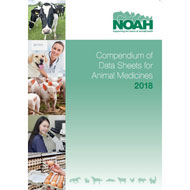NOAH publishes 2018 compendium of data sheets

“The NOAH Compendium remains a major part of NOAH’s efforts to assist the appropriate and responsible use of all animal medicines."
The National Office of Animal Health (NOAH) has published this year’s edition of its Compendium of Data Sheets for Animal Medicines.
A free copy of the book has been posted to all UK veterinary practices. It is also available online at www.noahcompendium.co.uk.
NOAH’s compendium contains the data sheets for the majority of veterinary medicines that are authorised for use in the UK, separated into colour-coded indexes. The book also includes the latest version of NOAH’s Code of Practice for the Promotion of Animal Medicines.
Dawn Howard, NOAH’s chief executive, commented: “The NOAH Compendium remains a major part of NOAH’s efforts to assist the appropriate and responsible use of all animal medicines.
“Every NOAH member, as well as the non-member participants in the NOAH Compendium, is a signatory to the NOAH Code of Practice on Promotion, which demonstrates their commitment to operate above and beyond any regulatory requirements.
“As always, our free of charge web-based Compendium, which is updated regularly, contains the most up-to-date information. If you have not been on the website lately you will see we have introduced a ‘Company Directory’ as well as ‘data sheets by company’, as well as improving the facility of the site to print individual data sheets.”
The app version of the compendium is currently suspended due to technical difficulties. Dawn added: “The app is currently being updated and we are working to get it back on line as soon as possible. If you have already downloaded the App, please note there will be no further updates to the information until we can resolve the issue, and the information it displays may not be the most recent update.”
If your practice has not yet received a copy of the book, contact Amy Davis at NOAH - a.davis@noah.co.uk. Extra copies can be ordered for £46 and special prices are available for bulk orders.



 The veterinary mental health charity Vetlife is inviting the veterinary community to join it for a sponsored cold-water dip.
The veterinary mental health charity Vetlife is inviting the veterinary community to join it for a sponsored cold-water dip.